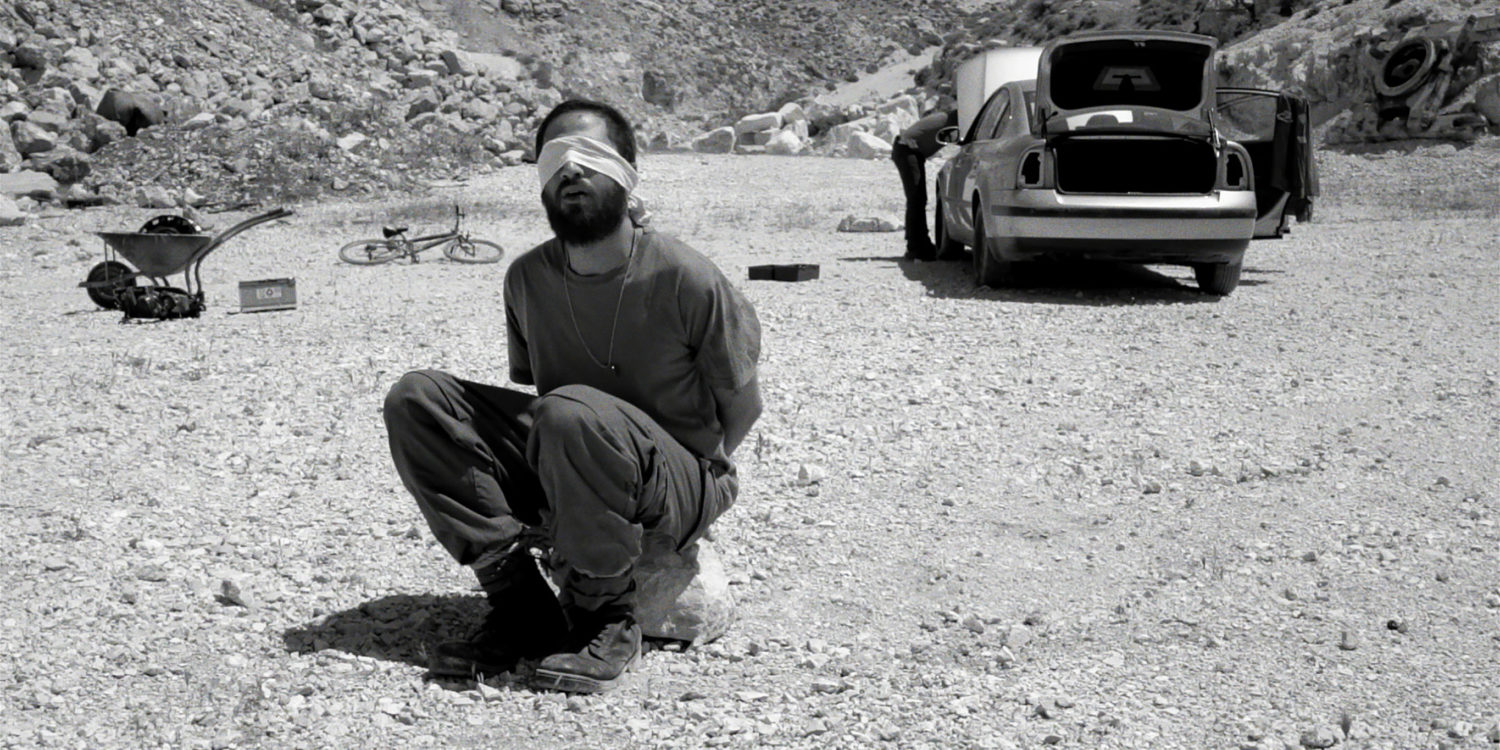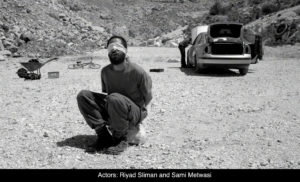Screening on 15 September 2016 at 6:15 pm at ICA, London part of Safar Film Festival. You can buy your tickets HERE.
Love, Theft and Other Entanglements, Palestine, 2015 directed by Muayad Alayan.
Reviewed by Palestinian writer and director Ahmed Masoud.
“You have stolen a whole country and you want to chop my head off for stealing a car?!” Musa asks the Israeli interrogator. But fear not, this film is neither about Israeli occupation nor the consequent suffering of Palestinians. It’s the story of a ‘normal human being and a weak one if you like’.
Musa, played by Sami Metwasi, is a Palestinian young man struggling to find his way in the West Bank. A labourer, he is constantly trying to obtain Israeli work permits to undertake construction work inside the ‘Green Line’ and uses it as an opportunity to steal whatever he can get his hands on, especially cars. It reminds me of the days I used to go with friends to the Erez Crossing between the Gaza Strip and Israel, waiting for Palestinian workers to return, some were loaded with stolen goods. Those that weren’t sold immediately at Erez made it to the Firas Market in Gaza City. Those stolen goods were our only way of getting good quality items while pretending to reclaim parts of our stolen country.
The life of a thief is always entangled with danger and risk, but when Musa steals one particular car from inside Israel, things start to take a different turn and he finds himself caught between Israeli forces and Palestinian resistance factions. When he starts to dismantle the car to sell its parts, Musa discovers something that makes him curse his luck.
Luck, or the lack of, is the invisible protagonist in this film. The more Musa tries to resolve his problems, the deeper he finds himself in trouble. Thus, the writer and producer, Muayad Alayan, carries on with the Palestinian tradition of presenting the wise fool very successfully. Musa’s character is very similar to Saeed in Emile Habebi’s classis novel, the Secret Life of Saeed, The Pessoptimist. Both try to lead an ordinary life surrounded by occupation, resistance, corruption, traditions and ambition. Both try to be ‘normal’ people who make terrible mistakes that drive our sympathy and astonishment at the same time.
However, writing about the life of a fool is not new to Arabic artistic production. Some of the famous tales in the Arab world which are known to both children and adults are the tales of Juha who is a fool saved mostly by his idiotic behaviour. Juha was a character who lived at the end of the Umayyad period and survived the political turmoil on his foolishness. His stories amused many others and people across the Arab world started telling stories about him (some of them were real) until they became oral tradition in the Arab world. However, the main difference between Juha and Musa/Saeed is that the latter does not use his foolishness deliberately. Also both characters experience different hardships. Where Juha is dealing with ordinary people who have the same cultural background, Musa’s hardships come from an occupying enemy who is determined to make life as hard as possible for Musa.
The use of the wise fool gives the film a unique sense of a humour and black comedy that only a capable and diverse actor like Sami Metwasi would be able to convey. His excellent performance is captivating in every dimension, particularly a convincing and entertaining body language. His accent, his behaviour, his looks, his gestures and even his silence are all of that Palestinian who has lived years through struggle and is trying to make do with them. It is clear that Sami has put a lot of effort into getting this unique character right. In my interview with Sami Metwasi, I asked him why he decided to play this role?
“When I received the script” He answered “It made me question what I was going to do with Musa’s character. He was a loser, someone who was not the typical Palestinian fighter or the guy you expect to see on the screen. I thought the way Rami and Muayad worked wrote the script was very smart and creative. It pushed me to think out of the box, moving away from the stereotypes which added value to our story and narrative, because not all Palestinian are fighters or warriors, we don’t all think the same way or absorb the occupation experience in the same way. We have different reactions and different sensitivities”
And like all wise fool tales, a love story always resides at the centre of all actions. Musa’s love to Manal, played by Maya Abu Alhayyat, is what drives most of the action. Manal and Musa have a daughter who is living with Manal and her husband, a rich official in the Palestinian Authority. Musa’s aim is to save enough money so he could leave Palestine and find a way to bring his beloved and their daughter abroad. Maya’s portrayal of the passionate Palestinian woman is indeed admirable, the understated tone of the character juxtaposes Musa’s idiotic character.
Cinematically, the film is beautifully shot, taking us through eye catching Palestinian landscape and delves deep into the detail of everyday life. From rugged hills, to a Falafel stall seller by the road, to a gorgeous traditional village home, the director certainly manages to take us onto a journey to see this beautiful country from and all its corners, including ugly concrete settlements. It’s perhaps the only Palestinian film that doesn’t show the Wall, Checkpoints or any other landmark of occupations save for settlements.
Love, Theft and Entanglement is a film that should go a long way, like Omar and Paradise Now, it’s unique, thrilling and painfully funny. You can watch it on 15 September at 6:15 at the ICA, London part of Safar Film Festival followed by a Q&A with director Muayad Alayan and curator Rasha Salti.
About Ahmed Masoud:
Ahmed Masoud is a Palestinian writer and director. He is the author of the acclaimed novel Vanished the Mysterious Disappearance of Mustafa Ouda. He can be found www.ahmedmasoud.co.uk


